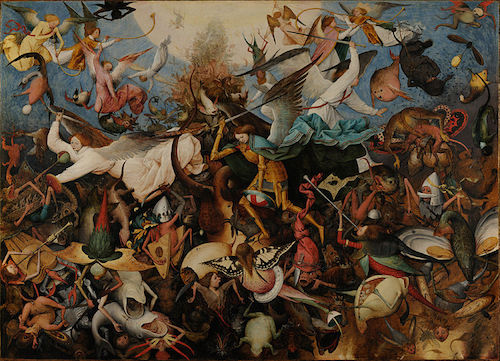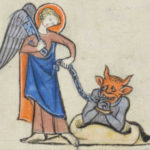We run our website the way we wished the whole internet worked: we provide high quality original content with no ads. We are funded solely by your direct support. Please consider supporting this project.

Theology That Accounts for Terrorism
The general assumption of both the Old and the New Testaments is that the earth is virtually engulfed by cosmic forces of destruction, and that evil and suffering are ultimately due to this diabolical siege. Jesus defined himself and his ministry in terms of aggressively warring against Satanic forces. Both he and his disciples recognized that he had come to destroy the devil and his works.
In this light, it is quite peculiar that after Augustine, throughout the church’s history up to the present, very few thinkers conceived of Satan as being in any way relevant to, let alone central to, the solution of the problem of evil. In terms of arriving at an ultimate explanation for evil, after Augustine the question always gets filed under the category of God’s providence instead of under the category of spiritual warfare, that is under the topic of what Satan and rebel angel and fallen humans freely choose to do against God’s will.
With Augustine it becomes a problem of understanding evil as a part of God’s will.
By contrast, the NT and the early postapostolic church always thought of the world as being caught up in a cosmic battle and thus as saturated with horrifying suffering and diabolical evil. That is the final explanation for evil. While the NT and the early church fathers taught that God is the final “why” as to the existence of all things, after Augustine, it is assumed that God is the final “why” for how these things and beings existed.
But the NT locates the ultimate “why” of evil actions in the angelic or human beings who bring about those actions.
In a state of war, bullets fly, bombs explode, mines are stepped on, and children are maimed. War is hell. This is expected. The only real problem is in confronting the evil and in overcoming it.
At the same time, the warfare worldview is admittedly not a worldview that many modern people find easy to accept. To many contemporaries, the notion is preposterous that real, semi-autonomous, self-determining and invisible spirits exist that can and do influence our lives. The whole thing sounds more like something out of a Star Wars movie than like serious contemporary theology.
One of the primary reasons that this is the case is due to the adoption of a model of divine perfection, which was derived form Hellenistic philosophy by Augustine and other thinkers in the church.
For example, from Plato, Aristotle, and the subsequent Hellenistic tradition, the church arrived at the notion that God was altogether unmoved, impassible, immutable, nontemporal and purely actual. Yet it is precisely these features of the church’s doctrine of God that undermines the warfare worldview. On the basis of this model of God, a meticulous, sovereign, divine blueprint was postulated to encompass all temporal events, including the idea of a cosmic war with evil.
This, however, renders the war a sham. For a war that meticulously follows a blueprint that has been drawn up by one of the parties involved in the war (God) is hardly a real war.
—Adapted from God at War, pages 55-67
Image: The Fall of the Rebel Angels, by Pieter Bruegel the Elder
Related Reading

Why Did Jesus Die on the Cross?
If asked why Jesus had to die on the cross, most Christians today would immediately answer, “To pay for my sins.” Jesus certainly paid the price for our sins, but it might surprise some reader to learn that this wasn’t the way Christians would answer this question for the first thousand years of Church history.…

Blessing the Soldiers of ISIS
In light of the overwhelming response to Greg’s post about loving the soldiers of ISIS, we thought we would explore Jesus’ teaching on this topic further. The following is an excerpt from Myth of a Christian Religion. The perspective below stands in contrast to the perspectives exhibited by many Christians, one being the recent article…

Podcast: How Does Spiritual Warfare Actually Work?
Greg talks about Spiritual Warfare and the risks of speculating about things we do not know anything about. http://traffic.libsyn.com/askgregboyd/Episode_0331.mp3

Podcast: Does God Love Satan?
Greg talks about the potential of Satan repenting. A great question by Matthew! http://traffic.libsyn.com/askgregboyd/Episode_0412.mp3

What’s Wrong With The World?
Hartwig HKD via Compfight The reports coming out of Fort Hood this morning once again highlight that our world is messed up. And it often feels like we are rearranging the deck chairs on the Titanic as we try to find answers to address the problems we face. Here are some reflections by Greg on…

Is There an Actual Satan?
Roger Olson wrote an excellent piece on how contemporary Christianity has tended to ignore or altogether extract Satan from the Biblical text. He explores some of the possible reasons for it and also discusses his own journey as he wrestled with the belief in the demonic realm. Really interesting. Here’s a personal experience of the…
